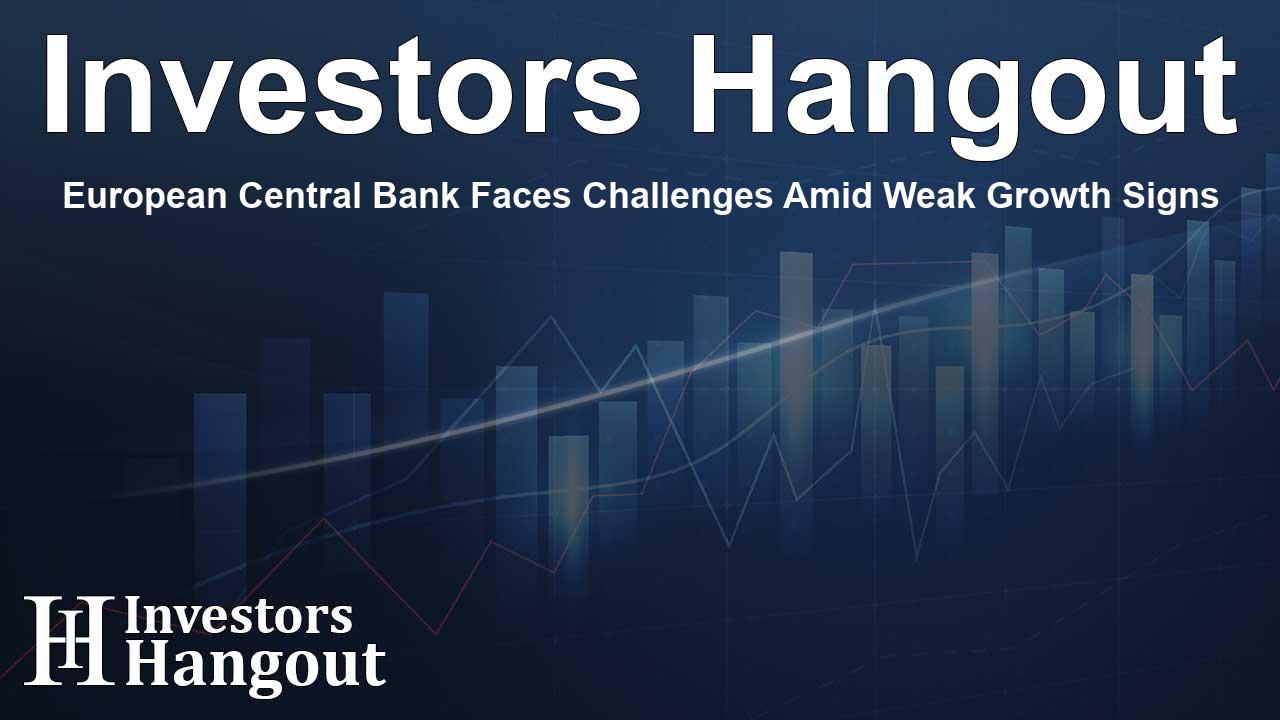European Central Bank Faces Challenges Amid Weak Growth Signs

Indicators of Economic Strain in the Euro Zone
After a series of interest rate cuts this year, the Eurozone faces significant economic challenges. Policymakers have expressed their concerns regarding persistently weak growth, exacerbated by potential U.S. trade tariffs. As inflation appears to be under control, the looming question is how these tariffs could adversely impact the economy.
Continued Rate Cuts on the Horizon
The European Central Bank (ECB) has already initiated three rounds of interest rate cuts in 2023, with market expectations leaning towards further reductions in the upcoming months. This anticipated strategy is a response to the region's fragile economic state, which some experts believe might be leading towards another recession.
Concerns from the Central Bank Leadership
Mario Centeno, the head of Portugal's central bank, highlights the stagnation in economic activity while pointing out that risks continue to accumulate. His caution stems from the potential for U.S. President Donald Trump's tariffs, which lingers as a serious concern. Centeno emphasized the importance of timely rate adjustments to avoid lagging behind in economic support.
Growth as a Central Priority
The priority of economic growth has shifted dramatically in ECB discussions, noted by Vice President Luis de Guindos. He remarked on the growing concerns over trade wars, asserting that tariffs could push economies into undesirable cycles of retaliation, leading to broader economic consequences. The delicate balance the ECB must maintain is becoming increasingly intricate as they navigate these challenges.
Effects of Trade Tariffs on Inflation
While the economic impact of U.S. tariffs could be severe, some European officials, including François Villeroy de Galhau, believe the inflation repercussions may not be as dramatic as anticipated. He noted that while short-term rates might remain stable, long-term rates could exhibit nuances, reflecting interconnected global market conditions.
Predictions for Future Monetary Policy
The Finnish central bank governor, Olli Rehn, further illustrated caution over expected economic recovery. Forecasts indicate a sluggish economic performance that may push the ECB to lower its key interest rates. Currently believed to be above the 'neutral' rates—estimated between 2% and 2.5%—the ECB's rates are projected to drop as policy adjustments unfold.
Market Expectations and Predictions
Determining the direction of ECB rates is critical. With market indicators suggesting a potential deposit rate drop to around 1.75% next year, such a change could incentivize economic growth. Rehn pointed out that an escalation in tariffs by the U.S. may be detrimental to not only European economies but also harm U.S. businesses as they might face retaliation globally.
Conclusion: Preparing for Uncertainty
As the situation continues to evolve, the ECB's proactive stance toward adjusting interest rates illustrates their commitment to fostering economic stability amidst global trade uncertainties. Policymakers will need to remain vigilant, adapting their strategies to the complex interplay of trade relations and economic performance.
Frequently Asked Questions
What are the main concerns of ECB policymakers?
ECB policymakers are primarily worried about weak economic growth and the potential impact of U.S. trade tariffs on the Eurozone.
How many times has the ECB cut interest rates this year?
The ECB has cut interest rates three times in the current year, responding to economic pressures.
What risk does the ECB associate with U.S. tariffs?
The ECB fears that U.S. tariffs could lead to trade wars, further destabilizing economic growth in the Eurozone.
What is the ECB's current interest rate level?
The current interest rate set by the ECB is at 3.25%, with expectations of a decrease in the near future.
How might long-term interest rates be affected by U.S. tariffs?
While short-term interest rates may remain stable, long-term rates could be influenced by global market conditions stemming from trade policies.
About Investors Hangout
Investors Hangout is a leading online stock forum for financial discussion and learning, offering a wide range of free tools and resources. It draws in traders of all levels, who exchange market knowledge, investigate trading tactics, and keep an eye on industry developments in real time. Featuring financial articles, stock message boards, quotes, charts, company profiles, and live news updates. Through cooperative learning and a wealth of informational resources, it helps users from novices creating their first portfolios to experts honing their techniques. Join Investors Hangout today: https://investorshangout.com/
Disclaimer: The content of this article is solely for general informational purposes only; it does not represent legal, financial, or investment advice. Investors Hangout does not offer financial advice; the author is not a licensed financial advisor. Consult a qualified advisor before making any financial or investment decisions based on this article. The author's interpretation of publicly available data shapes the opinions presented here; as a result, they should not be taken as advice to purchase, sell, or hold any securities mentioned or any other investments. The author does not guarantee the accuracy, completeness, or timeliness of any material, providing it "as is." Information and market conditions may change; past performance is not indicative of future outcomes. If any of the material offered here is inaccurate, please contact us for corrections.